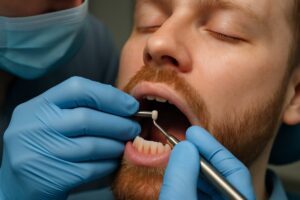Dental implants replace missing teeth and act like artificial roots fused to jawbone. They work well for most people, but no treatment is risk-free. Knowing common dental implants problems helps you catch trouble early, reduce damage, and get the right care. This article explains causes, signs, treatments, prevention, and when to see a specialist so you can protect your smile.
Common Dental Implants Problems: Early vs. Late
Early problems (weeks to months after placement)
Early dental implants problems in Lilburn, GA most often come from failed integration or immediate infections. Failed osseointegration happens when the implant does not fuse properly with bone, causing pain or loosening. Acute surgical complications can include excessive bleeding, swelling, or a surgical site infection. Prompt follow-up with your surgical team usually solves many early issues if treated quickly.
Late problems (months to years later)
Late problems include chronic infection (peri-implantitis), mechanical failures, and prosthetic wear. Peri-implantitis is inflammation and bone loss around an implant and can develop slowly. Mechanical issues like fractured crowns, loose abutment screws, or worn prosthetics may show up years after placement. These problems can affect chewing, comfort, and the implant’s long-term success.
Top Causes of Dental Implants Problems
Infection and peri-implantitis
Bacteria from poor oral hygiene or untreated gum disease can cause peri-implantitis. Infection leads to inflammation, pocketing, and bone loss around the implant. Left unchecked, infection can destabilize the implant and harm surrounding teeth.
Poor osseointegration (implant not fusing to bone)
When bone does not bond to the implant, the implant may feel loose or fail. Smoking, uncontrolled diabetes, certain medications, and poor bone quality all raise the risk of failed integration. Good medical control and careful planning lower this risk.
Mechanical and prosthetic issues
Loose screws, fractured crowns, mismatched lab work, and improper bite forces cause many prosthetic problems. A crown that doesn’t fit or a bite that overloads the implant can lead to repeated repairs or screw loosening.
Anatomical or surgical risks
Poor planning or surgical errors can damage nerves, perforate the sinus, or place an implant at the wrong angle. These anatomical issues may cause persistent discomfort, numbness, or increased stress on bone and prosthetics.
Signs and Symptoms to Watch For
Pain, swelling, redness, or persistent bad taste
Pain after the expected healing period, swelling, redness, or a foul taste often point to infection or inflammation. These signs warrant a timely check, especially if they do not respond to initial care.
Mobility or loosening of the implant or crown
Any movement of the implant, abutment, or crown is a red flag. Mobility can indicate failed integration, bone loss, or a loose screw. Do not wait — movement often means the implant is compromised.
Changes in bite, chewing pain, or gradual bone loss on X-rays
If your bite feels different, chewing becomes painful, or X-rays show bone loss, you may have mechanical or bone-related problems. These signs affect function and may worsen without treatment.
Treatment Options for Different Dental Implants Problems
Non-surgical management
Early or mild dental implants problems in Lilburn, GA can sometimes be managed without surgery. Treatments include oral or topical antibiotics, antiseptic rinses, improved home care, and professional debridement to remove bacterial buildup. Regular monitoring is key.
Surgical treatments
Advanced peri-implantitis or significant bone loss often needs surgery. Options include flap surgery for access and cleaning, decontamination of the implant surface, bone grafting to restore lost support, and soft tissue grafts to improve gum health. Surgery aims to stop disease and rebuild structure.
Prosthetic repairs and maintenance
Many issues are fixed by the lab or dentist: re-tightening or replacing screws, remaking ill-fitting crowns, occlusal adjustments to reduce excess forces, and improved restorative design. Good maintenance keeps prosthetics functioning longer.
When implant removal or replacement is necessary
If bone loss, infection, or mechanical failure is severe, explantation may be necessary. After removal, the site is often grafted and allowed to heal before a new implant is placed in a staged approach.
How to Lower Your Risk of Dental Implants Problems
Pre-treatment planning and medical optimization
Prepare before treatment: stop smoking, control blood sugar, and assess bone health with imaging. Proper medical optimization reduces the chance of dental implants problems in Lilburn, GA and improves healing.
Excellent home care and regular professional follow-up
Daily brushing, flossing around implants, and regular periodontal maintenance visits are crucial. Early checkups catch small problems before they become big ones.
Choose an experienced team and modern technology
Careful planning, guided surgery, and precise restorations lower complication rates. Technology and experience help place implants accurately and design restorations that last.
How Gwinnett Dental Implant Center Approaches Dental Implants Problems
Experienced, board-certified clinicians
Gwinnett Dental Implant Center in Lilburn, GA is led by board-certified periodontists and an experienced surgical team who diagnose and treat implant complications with evidence-based care and clear communication.
Advanced tools to prevent and manage problems
The practice uses Yomi robotic guidance for precise placement, CBCT imaging for 3D planning, and an on-site master lab to craft restorations that fit well and reduce prosthetic issues.
Patient-first process
Gwinnett’s team offers clear treatment plans, bilingual staff, and financing options to help patients get timely care when dental implants problems arise.
When To See a Specialist and What to Expect
Red flags that need prompt evaluation
Seek immediate evaluation for severe pain, swelling, mobility, pus, sudden bite changes, or persistent bad taste. These signs may indicate infection, failure, or other urgent issues.
Typical specialist visit and next steps
Expect a clinical exam, X-rays or CBCT imaging, and a clear diagnosis. The specialist will outline treatment options, timelines, and costs so you can make an informed decision.
Quick FAQ and Closing
- Q: Can implants be fixed?
- A: Many problems can be fixed with cleaning, surgery, or prosthetic repairs. Some failed implants require removal and replacement.
- Q: How long do repairs take?
- A: Minor fixes may take one visit; surgical repairs or grafting require multiple visits and months of healing.
- Q: Will insurance help?
- A: Coverage varies. Many plans help with parts of care; financing options can fill gaps.
If you notice any signs of dental implants problems, schedule an evaluation right away. Early action preserves bone, saves time, and protects your smile. Contact Gwinnett Dental Implant Center in Lilburn, GA to get checked and learn your treatment options.








